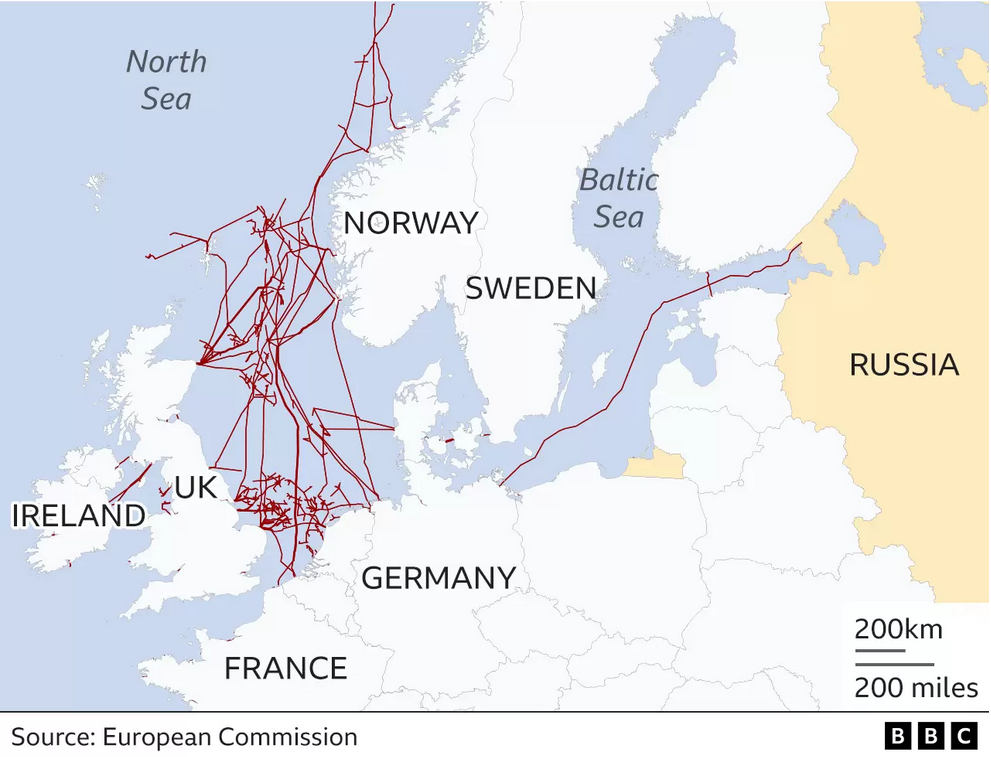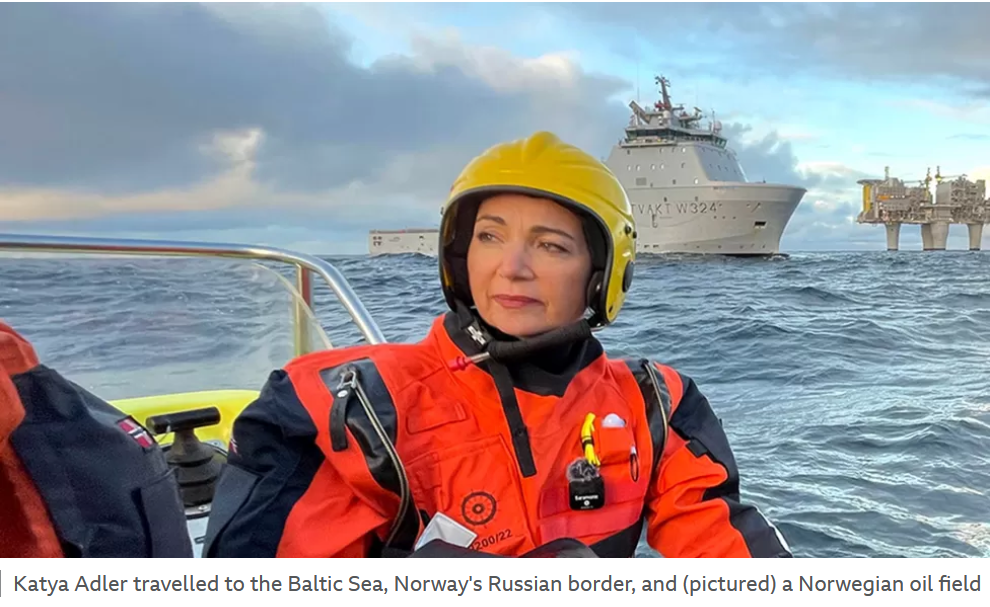In late October, and just a month after the sudden explosion of gas in the Baltic near the Danish island of Bornholm, the BBC's correspondent Katya Adler accompanied a Norwegian Navy vessel that sent a diving crew down to look at the damage to the Nordstream pipelines. Their cover story was that the danger of sabotage to Norway's gas pipelines was now real, and that any such act would threaten their supplies to Europe. At the end of the report, Adler interviews Jens Stoltenberg at the NATO headquarters in Brussels and asks him whether such an act could be called an "Act of War". In the light of Seymour Hersh's bombshell report on US planning and timing of the destruction of the Russian-German pipelines, which favoured Norway as the alternative gas supplier to Europe, this interview takes on a special significance, as well as implicating the UK as a participant in this act of war against Russia and Germany.
The whole report is dated November 18th on the BBC website, re-broadcast on SBS News on November 19th 2022, but the date stamp on the underwater drone footage is 27th October. Thanks to restrictions on overseas access to the BBC, the only version of this video report I can find is a screenshot from the SBS news broadcast, which occurred during a thunderstorm. In order to preserve the whole soundtrack I have replaced the missing footage with some waves. There were interesting pictures of the pipeline damage and wreckage which I saw but were not recorded.
In the BBC report there is a useful map showing all the undersea gas pipelines in the North Sea and the single and now inoperative pipeline through the Baltic. It can be seen that there is a very strong bond between Norway and the UK, who continue to share the North Sea gas fields. But the UK has I believe used most of its share up, so imports a significant quantity from Norway.

Clearly there is a lot more to be said about Hersh's "Trinity of Truth" as Scott Ritter has so nicely framed it, including who knew, and who colluded, in this act of 'State-sponsored terrorism'. But it should be clear from the BBC-UK involvement and interests, as well as Russian evidence, that the UK did both. Those of its partners, particularly in the Five Eyes, may be assumed to have known, and if not participating in the sabotage itself then certainly playing their part in promoting the false narrative of Russian responsibility - as highlighted below in Adler's article. I have picked out relevant parts of the text, with the odd comment, FYC: Three explosions ripped through the pipelines in late September with the force of a huge car bomb, according to intelligence experts. But no evidence has yet come to light about who was behind the attacks. However, on Friday a Swedish prosecutor said in a statement that traces of explosives had been found on several objects recovered from the site. The findings established the incident as "gross sabotage". The BBC had previously been given access to the underwater site. Aside from a Swedish newspaper journalist, no other media had been allowed. We found that the extent of the blast damage was far greater than had been thought. The explosions on the pipes, which were not in use at the time, (!) took place partly in what's known as the Swedish, and partly in the Danish, economic zones of the Baltic Sea. The west widely thinks the Kremlin was behind the attacks, a kind of message from Moscow - part of the hybrid - or non-conventional warfare - it's waging, including cyber attacks, away from the battlefield in Ukraine. Russia has blamed the sabotage on the west - vaguely on the US, and specifically on the UK Royal Navy, which promptly dismissed the allegation as an attempt by Russia to distract from its military failures. We discovered the Russian offshore vessel we had spotted was part of a separate investigation Moscow had begun into the Baltic explosions. While many in the West see this as a cynical move by Moscow, ('Cynical' to investigate a terrorist attack on your pipeline? !) Stockholm is worried that Russia might use this as a pretext to stage a more regular presence close to Swedish shores. The country is poised to join NATO. (Last, the implication that NATO could take action against Russia if it is found to have been responsible for the NS sabotage – for threatening critical infrastructure and security – a casus belli: ) "In Brussels, at Nato HQ, I spoke to the head of the alliance - Norwegian, Jens Stoltenberg. He insisted NATO had been debating sub-sea safety for a long time. Could an attack on critical underwater infrastructure be considered an act of war, I asked. Yes, said Jens Stoltenberg. It could trigger Nato's collective defence clause - where an attack on one ally is considered an attack against all. Strong words NATO would rather not put into practice. Its aim remains to avoid direct military conflict with Russia - for obvious, potentially nuclear, reasons. But as it flounders militarily in Ukraine, the Kremlin is waging determined, non-conventional warfare closer to our homes. By threatening our gas supplies, Vladimir Putin aims to advance on two other fronts. Hoping to weaken and destabilise Europe's governments and, as a consequence, reduce western support for Kyiv." Lastly, this revelation on Sunak, from Adler: "Back in 2017, Rishi Sunak, now UK prime minister, was a not-very-prominent backbench MP. He wrote a paper warning that a large-scale attack on UK undersea infrastructure would be an "existential threat to national security". And he called for steps to be taken to mitigate risks and ensure "our maritime assets are sufficient to the task". Yet his defence secretary, Ben Wallace, recently announced that the UK's first multi-role ocean surveillance ship would only be operational sometime next year. France, meanwhile, only produced its seabed war strategy back in February - after Russia invaded Ukraine."
DM 18th Feb 2023
